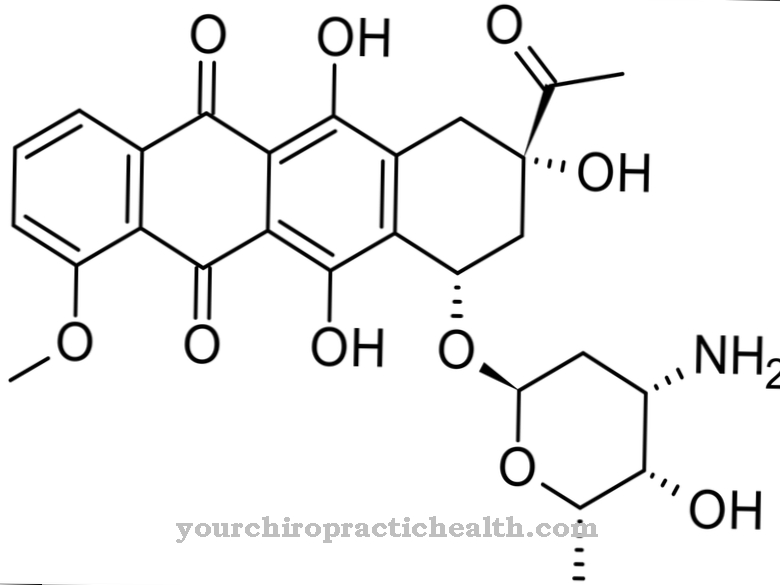Midodrine, known under the trade name Gutron®, is used as a medicine to treat orthostatic hypotension (low blood pressure). It is a so-called prodrug, the breakdown product of which (desglymidodrin) is the actual active ingredient.
What is midodrin?

Midodrine is converted into desglymidodrine after use with elimination of glycine, which then acts as a direct sympathomimetic. Both midodrine and the breakdown product desglymidrin have the same basic structure as the neurotransmitters adrenaline and noradrenaline and thus fulfill the same functions.
Midodrin is chemically in the form of a hydrochloride. It is a white, crystalline and odorless powder with a bitter taste, which is easily soluble in water but sparingly soluble in alcohol. If necessary, it is given in tablet form. After oral administration, it is quickly absorbed by the body and metabolized to the active substance within 120 minutes with elimination of glycine.
Excretion is mainly renal (via the urine) and is 90 percent complete after 24 hours. Midodrin has a plasma half-life of approx. 15 minutes and desglymidodrine of approx. 5-6 hours.
Pharmacological effect
The metabolite desglymidodrine is an agonist on the alpha adrenoceptors. These receptors are usually activated by the signaling substances adrenaline and noradrenaline. They are found in large numbers in the nervous system, in the salivary glands, in the cardiovascular system, in the urogenital tract and in the liver.
Desglymidodrine as a direct sympathomimetic stimulates these receptors like the neurotransmitters adrenaline and noradrenaline. There Midodrine and its metabolite desglymidodrine is water-soluble, but not lipid-soluble, only the peripheral alpha receptors are excited. This causes the vascular resistance to increase and the tonicity of the capacitance vessels, thereby causing the blood vessels to constrict, resulting in an increase in blood pressure.
Due to the arterial and venous vasoconstriction (vasoconstriction), this affects both systolic and diastolic blood pressure. Furthermore, midodrin also stimulates the alpha receptors in the urogenital tract, whereby the urine flow is delayed by increasing the tone at the bladder outlet. The constriction of the bronchial muscles only occurs at doses above 1 mg / kg.
Medical application & use
Midodrine is mainly used against low blood pressure, which occurs as a result of orthostatic dysregulation or the use of antidepressants and neuroleptics.
Specifically, this means its use against a drop in blood pressure when changing position and with neurogenic orthostatic hypotension. It should be noted, however, that all other measures should first be exhausted until it is certain that the treatment of the underlying disease did not eliminate the symptoms.
Primarily, low blood pressure should be avoided through a high-salt diet, avoidance of large meals, increased fluid intake and certain measures such as getting up slowly or wearing compression stockings.
Omitting drugs that lower blood pressure can also be the remedy of choice. Only if these measures are unsuccessful should treatment with midodrin be considered. In this context it should also be mentioned that although low blood pressure can reduce the quality of life, it rarely leads to serious damage to the organism as a consequence.
The underlying disease can be dangerous, but it is necessary to treat the cause first anyway. Midodrine increases low blood pressure without affecting the underlying disease. In exceptional cases, the drug is also approved for additional therapy in urinal stress incontinence.
Risks & side effects
Midodrine is contraindicated for cardiovascular diseases, hyperthyroidism, delayed urination due to an enlarged prostate, but also for kidney dysfunction and diabetes.
Of course, it should not be used if you are hypersensitive to the active ingredient. Common side effects when using Midodrin include tingling, goose bumps, itching or a feeling of cold in the skin. It can also lead to a slow pulse, palpitations, cardiac arrhythmias, high blood pressure when lying down and delayed emptying of the bladder. Digestive problems, restlessness, excitability, irritability and headaches are less common.
If you experience severe palpitations or severe pulse slowdowns, treatment with midodrine should be discontinued. Alternative treatment should then be considered. The use in combination with various drugs such as beta-blockers, tricyclic antidepressants, thyroid hormones, antiallergic drugs, anti-inflammatory agents or atropine should be avoided, as it can lead to undesirable side effects.



























